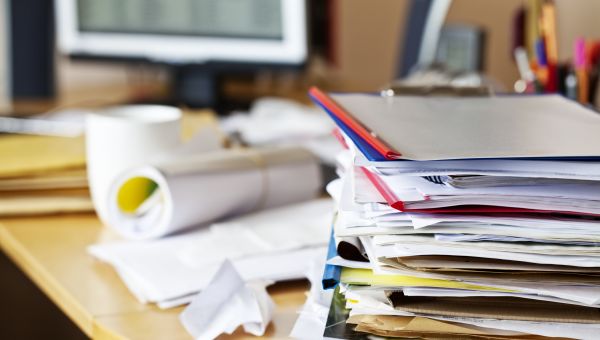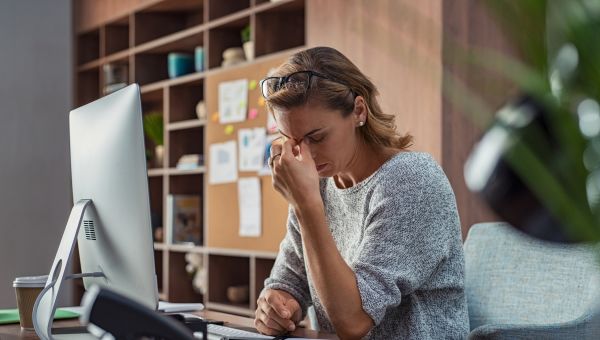5 work habits that may be harmful to your health
Learn how some things people do each day can take a toll, what you can do instead.
Updated on January 8, 2025

In the U.S., adults spend about 1,750 hours a year at work. That’s a lot, and it means that what they do in the office or out in the field can affect their health. From what people eat for lunch to how they sit (and for how long), unhealthy habits at work have the potential to contribute to a range of issues, such as anxiety, insomnia, back pain, weight gain, and even chronic conditions like heart disease and diabetes.
Learn more about some potentially unhealthy behaviors and get tips to help you protect your well-being.

Going out for lunch
If your schedule is hectic or you have little time to think about what you’ll have for lunch, you may be left with few options. And when you’re short on time, fast food may be one of your only options. But if you routinely get takeout, particular fast food, you may be consuming a lot more processed foods, or foods high in unhealth saturated fats or added sugars. Over time, this can lead to health issues, like high blood pressure, high cholesterol, or Type 2 diabetes. I can also make it more difficult to maintain a healthy weight.
Work smarter: Take some time to prepare a healthy lunch at home instead and load it up with fresh fruits and veggies, fiber, and lean protein, says Andrew Robinson, DO, of Lone Peak Hospital in Draper, Utah. And try to steer clear of quick, processed meals. “If you just go grab a microwaveable pizza, that’s not any different than going to a fast-food restaurant,” Dr. Robinson adds.

Checking work e-mails on your phone
Surveys have found that 76 percent of all U.S. workers and 81 percent of remote workers check emails before and after work each day. Half of employees also report checking their e-mails on their phone after hours. And while it might seem harmless to reply to a coworker’s request while climbing into bed, research suggests the opposite may be true. Not having boundaries around when you check e-mails can make it hard to mentally disconnect from work—which can affect sleep quality, relationships, and other aspects of everyday life.
For those who are working from home (a situation much more common since the COVID pandemic), the situation may be even worse. One 2022 study published in Occupational Health Science found that pressure on work-from-home employees to answer e-mails off-the-clock leads to emotional exhaustion.
Work smarter: Unless it’s an emergency, make checking e-mails a work-only activity, and turn off the notifications on your phone. “You need to be present,” says Robinson. “If you’re at work, be there 100 percent, but when you’re at home with family or doing your hobbies, be completely there.”

Being surrounded by cubicle clutter
Unsightly desk clutter, such as soda cans, loose paper, part of yesterday’s lunch, is more than just an eyesore. Though it depends on your personality, for some people, having piles of paper and junk around makes it harder to focus. Clutter may raise your stress level, too, making it harder to be productive.
Work smarter: Set aside time at the end of each day to organize your desk and toss all the trash. Clear out papers and objects you don’t use as well. This helps give you a fresh start each morning, and also helps de-clutter your brain. And don’t forget your digital clutter,. These days, computer desktop may often be a reflection of our physical desktop.

Leaning in (to your computer screen)
If you work at a cubicle or desk job every day, you may already be familiar with that bleary-eyed, achy-headed feeling. Sitting at your desk and staring at a screen for eight hours tires out your eyes, contributes to weight gain, and can also harm your back, neck, shoulders, and wrists. Plus, sitting in an uncomfortable position for too long could lead to tension headaches and poor posture.
Work smarter: Robinson suggests aiming for a more ergonomic workstation. That means keeping your monitor at eye level, maintaining good posture in a chair with lumbar support, and not forgetting to take short breaks each hour to get up, stretch, and move around.

Letting your stress level go unchecked
It’s healthy to have some stress in our lives. But when stress persists over time and begins to affect your daily routine, including your sleep and eating habits, it may have health consequences. Chronically stressed employees are more likely to get sick, have high blood pressure, experience headaches, and have trouble sleeping.
About 83 percent of workers in the United States report their work as being a significant source of stress. But workers who have the resources to tend to their mental health needs are not only healthier, but also more productive.
Work smarter: Take mini mental breaks, air your grievances calmly, and set realistic standards for yourself. Exercise, good sleep, meditation, or expressing yourself by writing in a journal can also help. And if work stress feels unmanageable, Robinson recommends reaching out to your healthcare provider (HCP).

International Labour Organization (ILO). Working Time and Work-Life Balance Around the World. Page last updated January 6, 2023.
American Heart Association. Can Processed Foods Be Part of a Healthy Diet? Page last reviewed July 31, 2024.
Tedone AM. Keeping Up With Work Email After Hours and Employee Wellbeing: Examining Relationships During and Prior to the COVID-19 Pandemic. Occup Health Sci. 2022;6(1):51-72.
Buffer. State of Remote Work 2023. Page accessed September 17, 2024.
Cleveland Clinic. Is Your Desk Messy or Tidy? Find Out What It Says About You. Page last updated June 3, 2024.
Mayo Clinic. Adult health: Office ergonomics: Your how-to guide. Page last updated May 25, 2023.
Occupational Safety and Health Administration (OSHA). Long-Term Stress Harms Everyone in the Workplace. PDF accessed September 17, 2024.
Occupational Safety and Health Administration (OSHA). Workplace Stress. Page accessed September 17, 2024.
More On


video

article

slideshow


video


video
